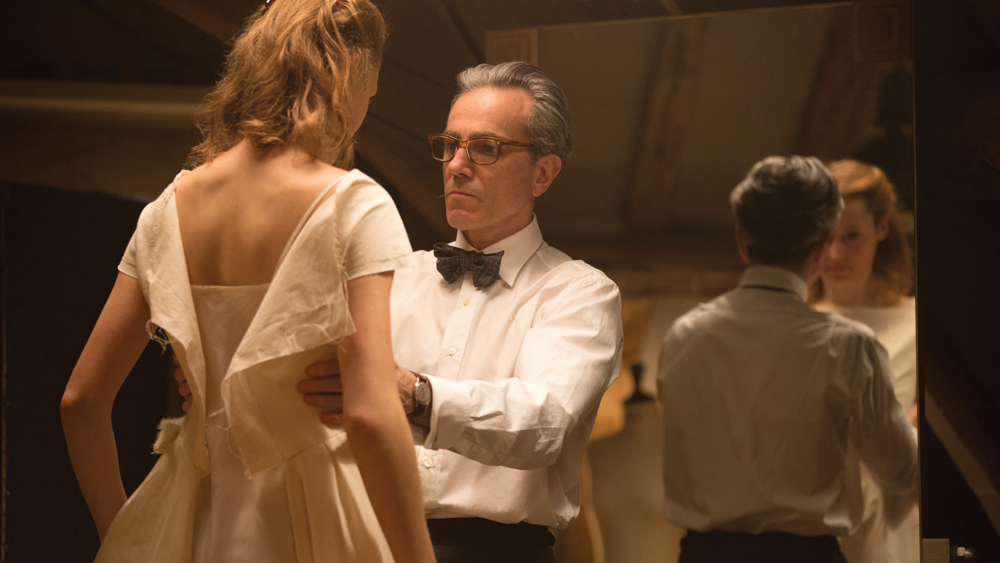Phantom Thread is a ghost story dressed as a love story. It’s a beautiful, expertly cut ghoul. A glistening blood diamond.
There is one literal apparition, briefly, a possible fever-induced hallucination by Reynolds Woodstock (Daniel Day-Lewis, out of retirement), a fashion designer for social royalty who speaks in a charming Herzogian murmur. He sees his dead mother at the end of his sickbed, still a little boy grieving over his precious mum, sad and wounded. The so-called House of Woodstock, the gorgeous London townhouse where he lives and works, is populated by its own cast of the barely-living. Paul Thomas Anderson’s ninth feature opens with morning rituals, as the women who sew and cut Reynolds’ dresses, mostly demure and middle-aged, file in, hang up their coats and get to work, a ring of gently swirling satellites.
Every genius needs his muse, and they become ghosts too, hanging on, waiting, made desperate and miserable by the alienation from his love, easily dispatched by Reynolds’ sister Cyril (Lesley Manville), a sort of live-in handler. There’ll be a new girl soon anyway: one is dismissed just as the film starts, and Reynolds is quick to fill the vacancy. In a trip to his country house, he meets the eye of Alma (Vicky Krieps), a self-conscious guesthouse worker who finds, in his attention and his dresses, a rebirth through new images of self-worth.
She is moved into the London residence, and joins Reynolds and Cyril for their daily excruciating breakfasts, serio-comic quiet time where he sketches out ideas for the day and she does her best not to make a peep when scraping her toast. Sensing Reynolds’ growing boredom with her, Alma gets nervous and desperate. He gets out the tape and takes her numbers, but she just can’t seem to measure up.
The final ghost is Reynolds himself, even if he doesn’t know it, made insubstantial by genius and the toxic obsessions and controls that come with it, hallowed out, a ‘hungry boy’ who gobbles up the women around him and comes away still famished. Phantom Thread is a domestic tragedy about the torment of romantic dependency and creative ego, like Hitchcock’s haunted Rebecca, or a less outrageous mother!.
Reynolds’ predictable, controlled life is a means to allow him the space and freedom to create, but it’s also mummifying and unintentionally funny. He wraps his grieving heart in the machinery of the genius auteur life and its bachelor routines. His total resistance to the compromises and, as he frames it, dishonesties, demanded by a relationship are hysterical and trite, the protestations of an elegant fuckboy. The sense of serene creative rhythms is so assuredly constructed that all diversions feel like a bit of a shock: later in the film, Reynolds abandons his work to attend a New Year’s Eve ball, and the colourful rowdiness hits like a profanity.
Like Reynolds’ existence, the film is carefully cultivated in Mark Tildesley’s design and Jonny Greenwood’s score, an exceedingly well-tailored creation that only slowly reveals its brittle bones. The poison between Alma and Reynolds darkens, each trapping the other with twisted, melodramatic gestures, the latest in Anderson’s pantheon of broken boys and girls. Wounds don’t heal, but they can sure be made pretty. Conor Smyth
Phantom Thread is on wide release from Friday 2nd February.






